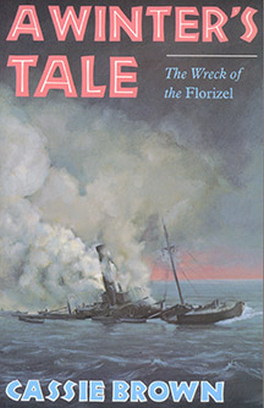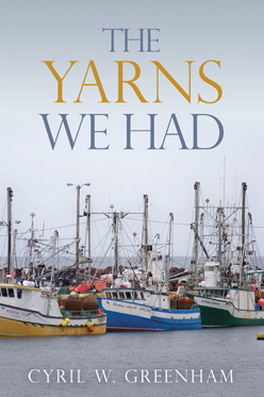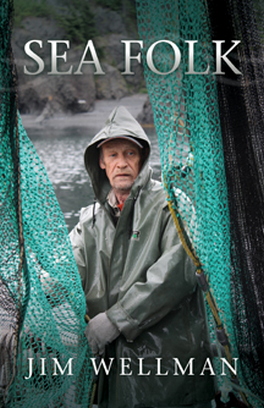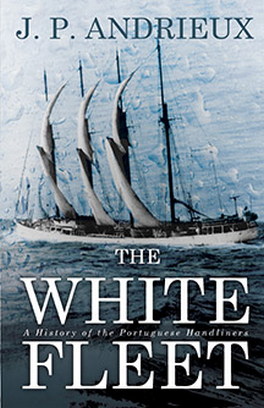The Deadly Sea
Life and Death on the Atlantic

Fishing is the most dangerous occupation in the world: in Atlantic Canada, an average of one person dies every month while working at sea. The Deadly Sea by bestselling author Jim Wellman contains twenty-five stories about men and women who work in the Atlantic Canadian fishing industry, ranging from biographies of professionals to tales of tragedy at sea. In Atlantic Canada, the sea has given generously of its riches. Tens of thousands of men and women make a living from its resources. Some work directly on the water as fishing people, while thousands of others work in fish processing plants. And still thousands more are employed in service industries that are tied directly to the commercial fishery. The number of fatalities at sea hasn’t changed much in the past fifty years, though the industry bears little resemblance to what it was just a few decades ago. Wooden schooners powered by wind and sail have been replaced by vessels with steel or fibreglass hulls and sophisticated technology, but we are reminded, every month, that new technologies are still no match for the power of an angry ocean.
Take Care of Your Mother
The cod moratorium that stunned Newfoundland and Labrador fishermen in July 1992 didn’t put an end to tragedy in the province’s inshore fishery. Barely a month after the moratorium went into effect, the small fishing community of St. Lewis–Fox Harbour, Labrador, was shocked by the loss of two of its fishermen. Caplin were plentiful on the Labrador Coast that summer, and on August 11, just a little over a month after the cod fishery was shut down, Ed Poole, his father, Earl, and cousin Wallace left their summer fishing station in Murray’s Harbour to haul a caplin net in nearby Crow Bay. That fateful Wednesday started out as a beautiful morning. It was sunny and warm, although there was a “bit of a breeze from the southwest,” as Ed described it. The three men were delighted to see that their net was full of caplin. “Boys, there’s enough caplin here to feed everyone in Fox Harbour all winter,” Wallace joked as they started hauling the net over the side of the boat. Ed was in the back of the speedboat, and shortly after Wallace’s upbeat comments he noticed lops splashing over the stern. “I said to Dad and Wallace that a fair bit of water was coming in, but I don’t know if they heard me or not because they didn’t look back but just kept on hauling more net and more caplin on board.” Perhaps Earl and Wallace were not worried about anything because, even though it was only eighteen feet, their boat was a flat-bottom design and very sturdy. Ed’s brother Fred says he remembers, when the boat was new, they were testing it out and they were surprised that four or five men could stand on the gunwales and the boat would hardly list at all. But somehow this time was different, and soon Ed realized that the amount of water coming in was worrisome. He tried bailing out the water, but it was a losing battle as more water was coming in than he could handle. That’s when Ed realized they were in big trouble. “I shouted to the others to move to the front because the stern was almost underwater.” His father and Wallace looked back and for the first time realized that the boat was half-submerged. As Ed suggested, they moved toward the bow, but the attempt to level the water inside the boat from back to front was too late and the little boat continued filling with more water. Ed says he recalls that someone seemed to move too quickly and, suddenly, the boat capsized and all three were thrown overboard. Ordinarily, getting thrown overboard in the circumstances the Poole men found themselves in that morning would not appear to be very serious. Despite the fact that Ed was the only one wearing a life jacket and the only one who could swim, the boat was only ten feet from shore. In fact, the net was tied to the rocks. What could go wrong? It was a warm day in summer, so it should have been just a matter of one of them getting ashore and throwing a line to the others, and the day should have ended with the men getting no more than a good soaking. But the ocean doesn’t always behave the way we think it should and, as often happens in times of crisis, people are not always certain about how and why some things occur. For example, Ed remembers that when he surfaced near the boat, he grabbed his father and kept him close at hand, but at first he couldn’t see any sign of Wallace. “I looked out to the southeast and there he was, about ten fathoms [sixty feet] away from us. I shouted at him and said, ‘How the hell did you get out there? Come back in out of it!’” Wallace heard his cousin and looked at Ed, and in a motion that resembled an attempt to walk rather than swim, he suddenly sank beneath the surface. That was the last time anyone ever saw Wallace alive. Because Ed was wearing a flotation device, it’s likely that he wasn’t underwater for any longer than a few seconds. His dad, on the other hand, was not wearing a life jacket and had big rubber boots on that were filled with water, pulling him down. Eventually, Ed saw his dad underwater, pulled him to the surface, and starting pushing him toward the side of the overturned speedboat. By then Earl was already fatigued, confused, and likely suffering from water ingestion. He seemed to know that he might not make it. Looking at his son, Earl said, “Ed, take care of your mother.” Just minutes later, Ed Poole realized that Earl had succumbed and there was nothing he could do except hold onto the boat with one hand and keep a firm grasp on his dad’s coat for fear of having him slip under the surface and losing him. As the boat drifted away from the shoreline, Ed tried to remain focused and figure out a plan to save his own life. Looking to see if there were any other boats in the vicinity, he saw several whales inching closer and closer toward him, as if they were curious about what was going on. “I looked up to the sky and I said, ‘Well, well . . . here I am up to my neck in water and now I got to deal with friggin’ whales.’” The whales kept their distance, but Ed had other issues to deal with. Although the air temperature might have been warm, the water was very cold. He noted that there were seven icebergs in Crow Bay that morning, and the boat was drifting straight toward one. He wondered whether he’d try and get on a berg if the boat came close enough but worried that it might even be colder on the ice than in the water. He didn’t have to make the decision. “Something strange happened. The boat was headed for the ice, but suddenly she took a turn and moved away and circled around, almost as if someone took her in tow or something,” he says. Meanwhile, back in Murray’s Harbour, Ed’s mom was anxiously glancing at the kitchen clock. Earl had told her that they’d be back by ten o’clock, but it was almost noon. They should be back by now, she thought. She wondered if the men were having engine trouble. She contacted Tom Holley, a family friend, who knew exactly where the Pooles’ caplin net was, and he left immediately to check on his friends. At first there was no sign of the Pooles’ boat, but as he drew nearer to their net, he saw a flash—like sunlight reflecting from a mirror. In later chats about the events of that day, Tom and Ed figured that what Tom saw was a reflection of the sun on Ed’s sunglasses. Whatever it was, it gave Tom cause to take a closer look, and a minute later he saw Ed, still clinging to his father’s jacket with one hand and the overturned boat with the other. Fortunately, Tom Holley was a big, strong man. Otherwise, it would have difficult to get Earl and Ed from the water into his boat. He managed to haul Earl in first and then got Ed on board. Tom says Ed was groggy and wanting sleep, but he started to come around once on board the speedboat. It was miraculous that all he felt was groggy. They figured Ed had been in the ice-infested ocean for about two hours and twenty minutes before Tom showed up. Ordinarily, most people would have been in an advanced state of hypothermia within twenty to twenty-five minutes, but somehow Ed Poole is different than most people and is still alive to tell the tale. Wallace’s body was recovered the next day, and although fishing communities have long been accustomed to tragedy at sea, the shock and sorrow is no less crushing when it happens to your own. August 11, 1992, will be long remembered by folks in Murray’s Harbour and St. Lewis–Fox Harbour, Labrador, as the day that fifty-nine-year-old Earl Poole and his thirty-year-old nephew, Wallace Poole, made their final voyage.[These stories] are simply and competently written and, in aggregate, give a broad picture of the fishing industry today.-- The Telegram --
Wellman does a wonderful job of describing the rough but rewarding life of those who rely on the ocean to make a living, and the fickle and unpredictable nature of the Atlantic Ocean.-- The Northern Mariner --
Shopping Cart
You have no items in your shopping cart
| Tax | Price | Qty | Total | |
|---|---|---|---|---|
| No items in the Cart. | ||||
| Sub Total | $0.00 |
|---|---|
| Shipping | $0.00 |
| HST (15%) | $0.00 |
| GST (5%) | $0.00 |
| Total | $0.00 |






















